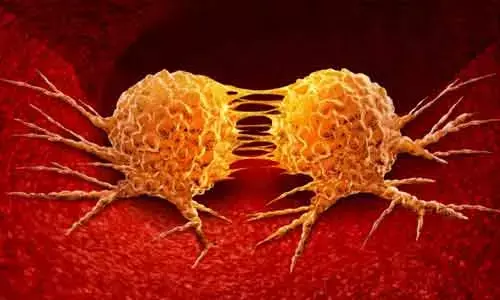- Home
- Medical news & Guidelines
- Anesthesiology
- Cardiology and CTVS
- Critical Care
- Dentistry
- Dermatology
- Diabetes and Endocrinology
- ENT
- Gastroenterology
- Medicine
- Nephrology
- Neurology
- Obstretics-Gynaecology
- Oncology
- Ophthalmology
- Orthopaedics
- Pediatrics-Neonatology
- Psychiatry
- Pulmonology
- Radiology
- Surgery
- Urology
- Laboratory Medicine
- Diet
- Nursing
- Paramedical
- Physiotherapy
- Health news
- Fact Check
- Bone Health Fact Check
- Brain Health Fact Check
- Cancer Related Fact Check
- Child Care Fact Check
- Dental and oral health fact check
- Diabetes and metabolic health fact check
- Diet and Nutrition Fact Check
- Eye and ENT Care Fact Check
- Fitness fact check
- Gut health fact check
- Heart health fact check
- Kidney health fact check
- Medical education fact check
- Men's health fact check
- Respiratory fact check
- Skin and hair care fact check
- Vaccine and Immunization fact check
- Women's health fact check
- AYUSH
- State News
- Andaman and Nicobar Islands
- Andhra Pradesh
- Arunachal Pradesh
- Assam
- Bihar
- Chandigarh
- Chattisgarh
- Dadra and Nagar Haveli
- Daman and Diu
- Delhi
- Goa
- Gujarat
- Haryana
- Himachal Pradesh
- Jammu & Kashmir
- Jharkhand
- Karnataka
- Kerala
- Ladakh
- Lakshadweep
- Madhya Pradesh
- Maharashtra
- Manipur
- Meghalaya
- Mizoram
- Nagaland
- Odisha
- Puducherry
- Punjab
- Rajasthan
- Sikkim
- Tamil Nadu
- Telangana
- Tripura
- Uttar Pradesh
- Uttrakhand
- West Bengal
- Medical Education
- Industry
Scientists Discover Link Between Nicotine and Breast Cancer Metastasis

WINSTON-SALEM, N.C. - Breast cancer is the second most common cancer among women in the United States, and cigarette smoking is associated with a higher incidence of breast cancer spread, or metastasis, lowering the survival rate by 33% at diagnosis.
While cigarette smoking's link to cancer is well-known, the role of nicotine, a non-carcinogenic chemical found in tobacco, in breast-to-lung metastasis is an area where more research is needed.
Now, scientists at Wake Forest School of Medicine have found that nicotine promotes the spread of breast cancer cells into the lungs.
The study is published in the January 20 online edition of Nature Communications.
"Our data shows that nicotine exposure creates an environment in the lungs that is ripe for metastatic growth," said Kounosuke Watabe, Ph.D., lead author of the study and professor of cancer biology at Wake Forest School of Medicine, part of Wake Forest Baptist Health.
This environment is called a pre-metastatic niche, which attracts pro-tumor neutrophils, a type of immune cells. The pre-metastatic niche releases a protein called STAT3-activated lipocalin 2 (LCN2) from the neutrophils to induce metastatic growth.
For the study, Watabe's team first studied 1,077 breast cancer patients and found that current smokers or former smokers have a higher incidence of lung metastasis compared to patients who never smoked.
Then, using a mouse model of breast cancer metastasis, the researchers discovered that persistent exposure to nicotine generates an inflammatory microenvironment in the lungs characterized by an influx of activated neutrophils to create a pre-metastatic niche.
Even after quitting nicotine for 30 days, the incidence of distant metastasis was not reduced, suggesting an ongoing risk for breast cancer patients who are former smokers.
Watabe and colleagues also looked for a drug that might block this accumulation of neutrophils and identified salidroside, a natural compound found in the plant Rhodiola rosea. This compound, which has anti-inflammatory, anti-cancer and anti-viral properties, significantly decreased the number of pro-tumor neutrophils and subsequently reduced the incidence of lung metastases in mice.
"Based on these findings, breast cancer patients should opt for smoking cessation programs that do not use nicotine replacement products," Watabe said. "Furthermore, our findings show that salidroside may be a promising therapeutic drug to help prevent smoking-induced breast cancer lung metastasis, although more research is needed."
https://www.nature.com/articles/s41467-020-20733-9
Hina Zahid Joined Medical Dialogue in 2017 with a passion to work as a Reporter. She coordinates with various national and international journals and association and covers all the stories related to Medical guidelines, Medical Journals, rare medical surgeries as well as all the updates in the medical field. Email: editorial@medicaldialogues.in. Contact no. 011-43720751
Dr Kamal Kant Kohli-MBBS, DTCD- a chest specialist with more than 30 years of practice and a flair for writing clinical articles, Dr Kamal Kant Kohli joined Medical Dialogues as a Chief Editor of Medical News. Besides writing articles, as an editor, he proofreads and verifies all the medical content published on Medical Dialogues including those coming from journals, studies,medical conferences,guidelines etc. Email: drkohli@medicaldialogues.in. Contact no. 011-43720751


